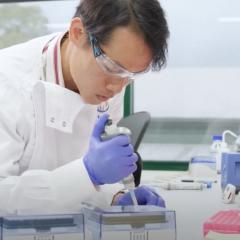A world-first randomised controlled trial has found robotic keyhole surgery for prostate cancer is no more effective than open surgery for urinary control, erectile function and cancer outcomes at the early time-point of 12 weeks follow-up .
The University of Queensland Centre for Clinical Research’s Professor Robert ‘Frank’ Gardiner AM said the trial of robotic and open prostatectomy at the Royal Brisbane and Women’s Hospital examined outcomes for more than 300 Australian men for the 12 weeks after their surgery.
“Contrary to common clinical belief, our research found no significant statistical differences between the robotic approach and open surgery at this early time-point,” Professor Gardiner said.
Prostatectomy is surgery to remove the prostate gland when cancer has been detected.
Robot-assisted prostatectomy surgery has been adopted by health professionals over the past 16 years.
“Surgery has long been the dominant approach for the treatment of localised prostate cancer, with many clinicians now recommending the robotic method to patients,” Professor Gardiner said.
“Many clinicians claim the benefits of robotic technology lead to improved quality of life and oncological outcomes – but our randomised clinical trial has found no statistical difference between the two groups at 12 weeks follow-up.”
There was no difference between the groups in urinary and sexual function, and both required the same time in days away from work.
There was no significant difference in the number of post-operative complications from the two[FG1] types of surgery.
Professor Gardiner, who is a consultant urologist at the Royal Brisbane and Women’s Hospital, said the study team was now following up the patients to see if there were differences in quality of life and cancer outcomes two years after surgery.
“In the interim, we encourage patients to consider all their treatment options and choose an experienced surgeon rather than choose a specific surgical approach.”
The trial, funded by Cancer Council Queensland, involved the study team of Adjunct Professors Suzanne Chamber and Hema Samaratunga, Professors Martin Lavin and Frank Gardiner from the UQ Centre for Clinical Research, the Department of Urology at RBWH and the Menzies Health Institute Queensland, with support from the Urological Society of Australia and New Zealand
The study is published in The Lancet. Click here for UQ news feature.
Media: Professor Frank Gardiner, f.gardiner@uq.edu.au ; Jenny Johnston, UQCCR, j.johnston2@uq.edu.au, +61 7 3346 6041, 0416 885 502 or 0438 753 471



